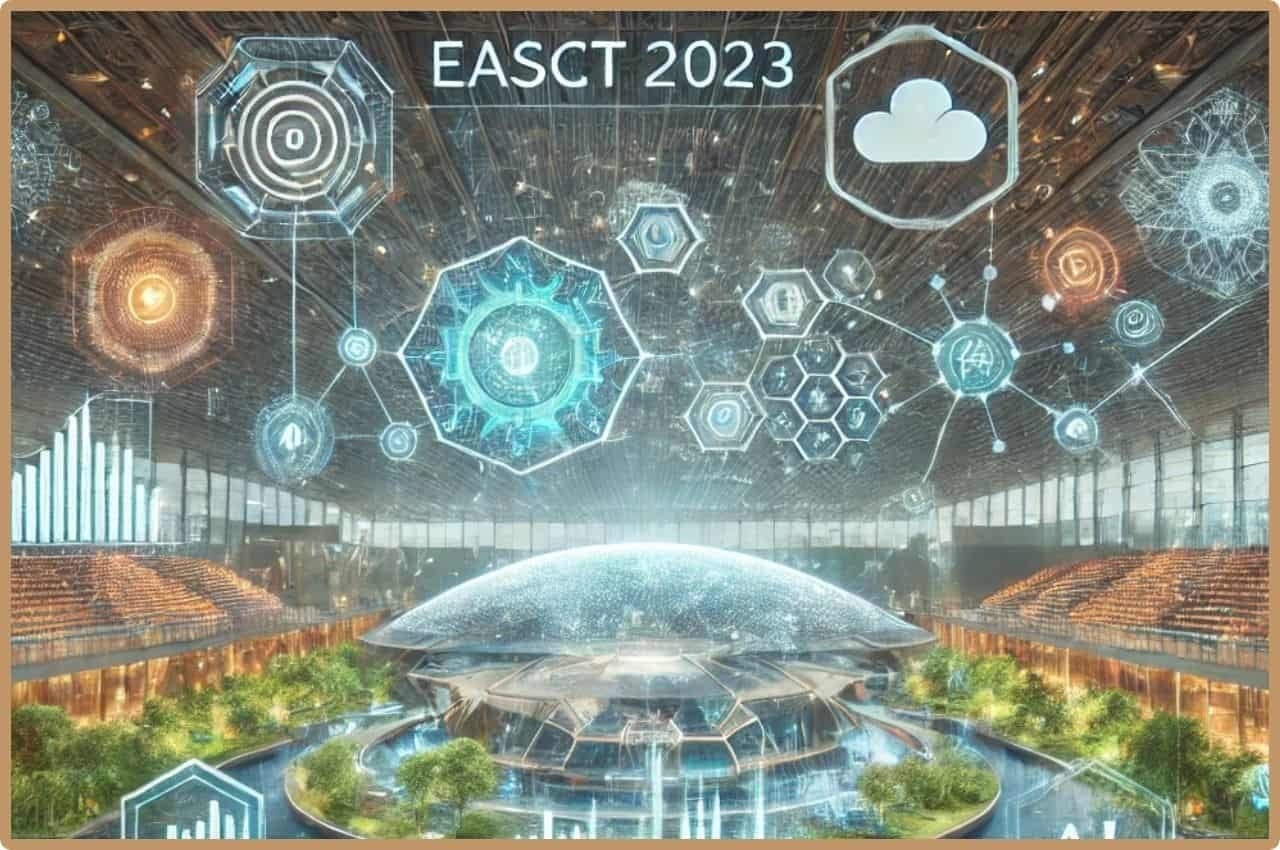EASCT 2023: Advancements in Evolutionary Algorithms and Soft Computing
Introduction to EASCT 2023
The International Conference on Evolutionary Algorithms and Soft Computing Techniques (EASCT 2023) occurred on October 20-21, 2023, at the RV Institute of Technology and Management in Bangalore, India.
It brought together researchers, academicians, and industry professionals from around the globe to discuss innovative approaches to computational intelligence. This year’s theme centred around sustainable computing and the application of energy-efficient algorithms, highlighting the role of technology in solving critical environmental challenges.
EASCT 2023 served as a platform for presenting cutting-edge research and fostered collaboration among experts across various fields, including computer science, data science, and engineering. Focusing on soft computing techniques such as neural networks, fuzzy systems, and genetic algorithms, the conference provided deep insights into solving complex real-world sustainability-related problems.
Objectives and Themes of EASCT 2023
Key Objectives of EASCT 2023
The conference aimed to address several critical objectives, which included:
- Promoting Sustainable Computing: Encouraging the design and implementation of algorithms that minimize energy consumption, reduce carbon footprints, and enhance overall computational efficiency.
- Advancing Soft Computing Research: Exploring new advancements in soft computing techniques, such as fuzzy logic, evolutionary computing, and neural networks, focusing on practical applications in various domains.
- Fostering Collaboration: Providing a collaborative environment for researchers, students, and professionals to exchange ideas, share knowledge, and establish partnerships for future projects.
Major Themes Explored
The themes covered during EASCT 2023 were diverse, focusing on theoretical and practical aspects of evolutionary algorithms and soft computing. Key themes included:
- Sustainable Algorithms for Energy Efficiency
- Presentations under this theme delved into developing algorithms specifically designed to optimize energy use in computing systems, such as smart grids, IoT networks, and cloud computing. Research papers demonstrated how these algorithms can significantly reduce energy consumption while maintaining high performance.
- Real-World Applications of Soft Computing
- This theme explored the application of soft computing techniques in areas like medical diagnostics, natural language processing (NLP), image recognition, and autonomous vehicles. Attendees understood how fuzzy logic, genetic algorithms, and neural networks address complex challenges across various industries.
- Hybrid Approaches in Evolutionary Computing
- Hybrid approaches, which combine multiple soft computing techniques, were highlighted as practical solutions for tackling highly nonlinear problems. These approaches were showcased through case studies on optimization problems, supply chain management, and financial modelling.
- AI for Sustainability
- Another significant theme was AI-driven solutions for sustainable development. Presentations demonstrated how AI and machine learning models optimize resource allocation, predict environmental changes, and create energy-efficient designs in architecture and manufacturing.
- Ethical Considerations in AI and Soft Computing
- The ethical implications of deploying AI and soft computing technologies were also discussed. Topics included fairness in AI algorithms, data privacy, and ensuring that sustainable computing solutions are transparent and accessible.
Key Presentations and Highlights
Notable Keynote Sessions
EASCT 2023 featured distinguished speakers who shared their expertise on current trends and future developments in evolutionary algorithms and soft computing:
- Dr. Ananya Sharma: Dr. Sharma, a renowned AI researcher, delivered the opening keynote on “Soft Computing for Green Technologies.” Her presentation emphasized the potential of neural networks and fuzzy logic in promoting energy-efficient designs across different industries, including transportation and infrastructure.
- Prof. Mark Jensen: In his talk on “Advancements in Genetic Algorithms for Optimization,” Prof. Jensen presented recent breakthroughs in using genetic algorithms for solving complex optimization problems, particularly in logistics, robotics, and bioinformatics.
- Dr. Emily Rodriguez: Dr. Rodriguez discussed the integration of evolutionary computing with IoT for smart cities, focusing on adaptive algorithms that can optimize traffic flow, energy distribution, and waste management.
Workshops and Technical Sessions
The conference also featured workshops and technical sessions that provided hands-on experience with the latest tools and techniques in soft computing:
- Workshop on Fuzzy Systems: Attendees participated in interactive sessions led by experts, learning to apply fuzzy logic in real-time decision-making systems, such as automated control systems and sensor networks.
- Neural Network Applications: Technical sessions focused on advanced neural network architectures, such as convolutional neural networks (CNNs) and recurrent neural networks (RNNs), and their implementation in image classification, natural language processing, and anomaly detection.
- Genetic Algorithm Optimization Lab: This hands-on lab allowed participants to experiment with genetic algorithms to solve optimization problems, mainly tuning parameters, for better performance in real-world applications.
Proceedings and Research Contributions
The proceedings of EASCT 2023 comprised over 150 research papers, each contributing to the evolving landscape of soft computing. Notable contributions included:
- A New Approach to Energy-Efficient Neural Networks: This paper introduced a method for designing energy-efficient neural networks that consume up to 30% less energy than traditional models without compromising accuracy.
- Hybrid Fuzzy-Genetic Algorithms for Smart Grids: This research focused on integrating fuzzy logic with genetic algorithms to optimize energy distribution in smart grids. It showed promising results in reducing power loss and improving grid reliability.
- AI-Driven Water Resource Management: This study demonstrated the use of AI algorithms to optimize water distribution in arid regions, showcasing a practical solution to water scarcity through intelligent resource management.
Looking Ahead: EASCT 2024 and Beyond
The success of EASCT 2023 has paved the way for continued collaboration and innovation in soft computing and evolutionary algorithms. Organizers are already planning for EASCT 2024, expecting broader participation and deeper exploration of AI’s role in sustainability.
Future editions of the conference are likely to include:
- Expanded Focus on AI Ethics: There will be a stronger emphasis on ethical AI, with discussions on building responsible AI models that align with sustainability goals.
- Emerging Trends in Soft Computing: The conference will cover newer developments in soft computing, such as quantum-inspired algorithms and neuro-symbolic AI, to tackle increasingly complex global challenges.
- Interdisciplinary Collaborations: The next conference encourages interdisciplinary research, inviting experts from biology, economics, and urban planning to collaborate on soft computing applications.
FAQs about EASCT 2023
What is EASCT 2023?
- EASCT 2023 is the International Conference on Evolutionary Algorithms and Soft Computing Techniques, which will focus on AI-driven solutions for sustainability and energy efficiency.
Who attended EASCT 2023?
- The conference was attended by researchers, academicians, industry professionals, and students from various countries.
What were the major themes of the conference?
- Major themes included sustainable computing, real-world applications of soft computing, hybrid approaches in AI, and ethical considerations in AI deployment.
What were some key topics covered in the conference proceedings?
- Topics included energy-efficient neural networks, hybrid algorithms for smart grids, and AI-driven resource management solutions.
What are the plans for EASCT 2024?
- EASCT 2024 will explore AI ethics, emerging soft computing trends, and interdisciplinary collaborations.
Conclusion
EASCT 2023 marked a significant milestone in developing sustainable AI and evolutionary algorithms. With a diverse range of topics, expert speakers, and hands-on workshops, the conference successfully fostered knowledge exchange and collaboration. As the world moves towards greener technologies, the insights gained from EASCT 2023 will be crucial in shaping the future of AI and sustainable computing.




